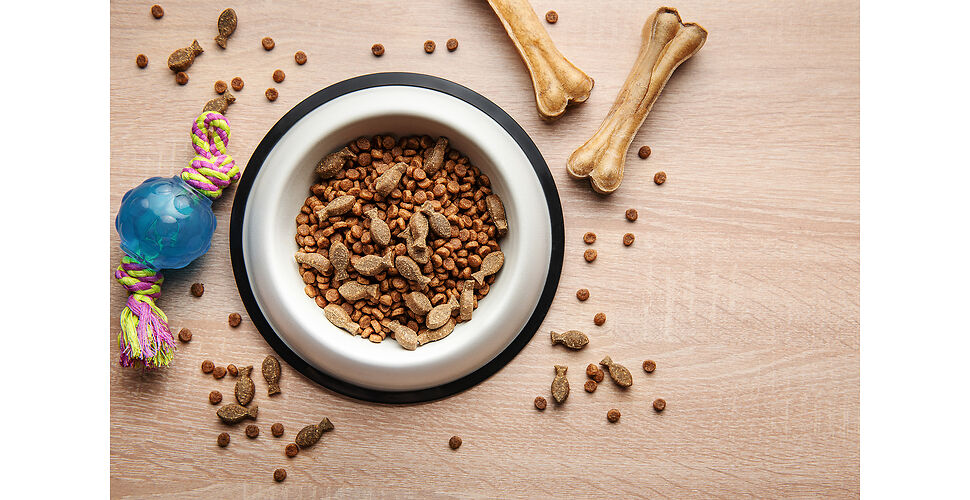
March 10th, 2023 by
As a dog owner, you want the best for your pet. That means giving them the best food, and treats and making sure they're properly groomed. But did you know that what goes in also affects what comes out? If a dog's diet is bad for its digestive system, it can cause upset stools and even diarrhoea. So, if your dog has sensitive stomach or digestion issues it may be time to switch up their diet!
What are the symptoms of a sensitive stomach?
The term "sensitive stomach" can be used to describe a number of different conditions. The most common is food sensitivity, which occurs when your dog's body reacts negatively to certain ingredients in his food.
If your pup has a sensitive stomach, he might experience gas, diarrhoea or vomiting after eating certain foods. Other symptoms that may be an indication that your pooch is suffering from a bad stomach can be excessive panting, lethargy and a lack of appetite may also notice that your pup is drinking more than usual.

Common Causes of a Dog's Sensitive Stomach
So, you might be wondering what can be the cause of a dog's sensitive stomach. The truth is it can be caused by a number of different things, including food allergies and stress.
Food allergies and intolerances (when the body doesn't produce enough enzymes to break down specific nutrients) can manifest in a variety of ways: your dog may have an upset stomach or loose stool, but he could also develop a rash or even have difficulty breathing. If you suspect that your pup has a food allergy, it's important to consult with your veterinarian before making any changes to his diet. They'll likely recommend trying one new protein at first (like chicken) before switching him over completely--this way you'll know whether the problem was actually caused by something else entirely (like adding new ingredients).
Other causes of digestive upset include inflammatory bowel disease (IBD) which is when the intestine becomes overrun with inflamed cells. Intestinal parasites like giardia or coccidia can also be a cause of stomach upset as well as diarrhoea, constipation and bloating if left untreated for too long. So, it is important that if your pup displays these symptoms and they persist even after a diet change get advice from your vet.
Stress is another common cause of sensitive stomachs in dogs; changes in your dog's environment that may have caused some stress in your dog's life, such as separation anxiety, a new home or the introduction of a new pet or maybe they themselves have been newly adopted they may also experience digestive issues as well as other symptoms like anxiety and depression. In this case, there isn't really any way around fixing these problems except through patience on behalf of both yourself and your pet.
How to Treat a Dog's Bad Digestion
You may have noticed that dogs love to eat, which is why making sure they have a balanced and healthy diet is the best way to prevent stomach issues from developing likewise tailoring a great diet is a great way to help soothe sensitive stomachs.
To help your dog's digestion, you should avoid the following foods:
· High-fat and high-sugar foods. These can cause diarrhoea and stomach upset in dogs.
· High-fibre foods such as beans, corn and peas. They're also known to cause gas in dogs with sensitive stomachs because they're difficult for them to digest properly (and if you've ever had a bad case of indigestion after eating beans or peas, then you know what we mean).
· High-protein foods like meat products (which tend to be rich in fats), eggs (which may contain salmonella) and dairy products like milk or cheese; are all sources that contain lots of protein but not much else besides fat which could cause digestive issues if consumed regularly over time - especially when combined with other types of food from above!
Instead of the above foods, try to include the following foods instead:
· Boiled lean chicken breast and turkey are good meat options as not only are they tasty but they are still very tasty!
· Fish such as tuna that has been tinned in spring water is also good for dogs with sensitive stomachs, however, ensure that it is not canned in oil as this will upset their stomach.
· White rice is soft and easily digested and is very nutrient-rich.
· Pumpkin is also a great option if you have access to it, it's extremely rich in nutrients and absorbs slowly.
Of course, if changing your dog's diet does not fix the problem then it is important that you get your pooch checked out at the vet as it may be caused by a more serious underlying issue that needs specialised treatment.
If your dog has a sensitive stomach, it's important to make sure he is eating the right food. The best way to do this is by consulting with your veterinarian or a professional dog nutritionist. They will be able to help you find the right brand of food that will be good for your dog's digestive system and keep him feeling great!

Comments
Leave a reply
Your e-mail address will not be published. All fields are required


